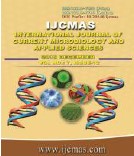


 National Academy of Agricultural Sciences (NAAS)
National Academy of Agricultural Sciences (NAAS)

|
PRINT ISSN : 2319-7692
Online ISSN : 2319-7706 Issues : 12 per year Publisher : Excellent Publishers Email : editorijcmas@gmail.com / submit@ijcmas.com Editor-in-chief: Dr.M.Prakash Index Copernicus ICV 2018: 95.39 NAAS RATING 2020: 5.38 |
Brinjal (Solanum melongena L.) is one of the most important vegetable cultivated all over India. This crop is infected by many diseases and the most important disease reported in this crop causing yield loss about 90-100% is collar rot caused by Sclerotium rolfsii Sacc. Biological control of soil borne plant pathogen is gaining much importance due to its eco-friendly, economic and being harmless to non target organism in nature. Seven organic inputs namely Trichoderma viride, Pseudomonas fluorescens, Bacillus subtillis, Neem oil, Eucalyptus oil, Mustard cake and Cow urine were evaluated against Sclerotium rolfsii. The in vitro evaluation revealed highest average mycelium growth inhibition with cow urine (@ 5%) concentration shows maximum inhibition (100%) followed by Trichoderma viride (72.08%) and Eucalyptus oil (57.11%). In the present study soil treatment (@ 2g/plot) and seedling root dip treatment (@ 100g/lit) with Trichoderma viride shows the lowest plant disease incidence (7.41%) significantly highest germination per cent recorded (95.89%) and highest plant height (72.63 cm). The soil treatment (@ 200g/plot) with soil amendment mustard cake has significant effect on seed germination (71.91%). Thus it is concluded that brinjal collar rot can be effectively managed by soil treatment and seedling root dip treatment with bio-agent viz. Trichoderma viride, Pseudomonas and Bacillus, botanicals viz. neem oil and eucalyptus oil, cow urine and soil amendment with mustard cake.
 |
 |
 |
 |
 |